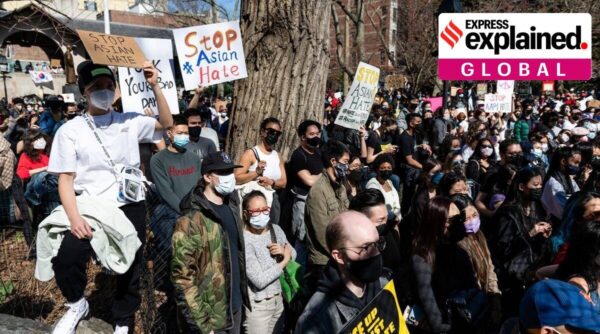A letter by a gaggle of 177 Stanford University academics has expressed concerns over racism “fueled” through the US Department of Justice’s China Initiative, which actively looks at Chinese “spies” at the US universities.
The professors have stated that though activities like property theft and economic espionage – sanctioned by the Chinese government – must be addressed, the Department’s initiative has “deviated significantly from its claimed mission”.
“…it is harming the United States’ research and technology competitiveness and it’s fueling biases that, in turn, raise concerns about racism ,” the letter argues.
Then US Attorney General Jeff Sessions introduced the program in November 2018, under former President Donald Trump, with the aim to counter “Chinese national security threats”.
In his announcement speech, Sessions had stated that the China Initiative will help “meet the new and evolving threats to our economy”.
“Today, we see Chinese espionage not just happening against traditional targets like our defense and intelligence agencies, but against targets like research labs and universities, and that we see Chinese propaganda disseminated on our campuses,” he said.
Among the ten goals identified under the Initiative, one involves the appliance of the Foreign Agents Registration Act, which mandates any foreign entity working within the interest of foreign powers to register intrinsically , to “unregistered agents seeking to advance China’s political agenda.”
To address espionage in universities, the program insists on an enforcement strategy to deal with “non-traditional collectors” like researchers in labs or universities who engage in unsanctioned transferring folks technology.
It also aims to make awareness at campuses about certain influences posing a threat to freedom and open discourse in universities and colleges.
Last week, a US federal judge acquitted Anming Hu, a former nanotechnology expert at the University of Tennessee Knoxville, accused of hiding Chinese ties in his NASA research grant application.
The government had alleged Hu knowingly concealed his affiliation to the Beijing University of Technology so as to “defraud NASA”, causing it to act contrary to the restrictions against funding any work involving collaboration or participation with China in any way.
However, acquitting Hu of the fees , the judge stated in his ruling that there was “no evidence presented that defendant ever collaborated with a Chinese university in conducting his NASA-funded research, or used facilities, equipment, or funds from a Chinese university within the course of such research”.
In July, the Department of Justice had moved to drop cases against five visiting researchers, who were arrested last year for hiding their ties to China’s People’s Liberation Army. The case of 1 of the arrested researchers, Tang Juan, was granted dismissal the subsequent day. The department ascertained that she had essentially served her time since the visa fraud charges entail a maximum sentence of a year or less, and Tang and therefore the other four defendants had been imprisoned or restricted in other ways for that period as they awaited trial.
A report by The ny Times states that consistent with officials over 1,000 researchers affiliated with the PLA left the US, following these arrests last year.
In a year-end review, the Department of Justice stated that under the initiative, it had obtained three guilty pleas within the period 2019-20 out of the ten cases of alleged “trade secret theft” with Chinese connections. Similarly, it had obtained three convictions out of the ten cases brought against academics for fraud, smuggling or other charges.
n its letter, the group of Stanford University professors stated, “the China Initiative disproportionally targets researchers of Chinese origin. Publicly available information indicates that investigations are often triggered not by any evidence of wrongdoing, but simply because of a researcher’s connections with China.”
The letter went on to accuse the department of “misleading the public” that these prosecutions are an attempt to combat national security threats as “most prosecutions are for misconduct like failure to disclose foreign appointments or funding.” The letter added that these problems shouldn’t be equated to “national security concerns.”
Lastly, it argued that the Initiative has hampered the recruitment of Chinese scholars by creating a “hostile environment” for Chinese-origin immigrants or Chinese-Americans.
This isn’t the primary vocal criticism of the China Initiative. Among other involves action by various organisations, a joint letter by the National Council of Asian Pacific Americans and Stop AAPI Hate in August had also urged US President Joe Biden to pause the program, posing for an independent review into its work.
“In practical effect, the Initiative, which formally began under the previous Administration, subjects Asian American and Asian immigrant scientists et al. — particularly those of Chinese descent — to racism , surveillance and wrongful prosecutions, where no evidence of economic espionage or secret theft exists,” the letter stated.
The involves review or end of the China Initiative come amid the Biden administration’s growing concerns over China’s threat to national security.
In its recent annual intelligence report, the US laid emphasis on China’s push for “global power”. The report stated that it “presents a prolific and effective cyber-espionage threat, possesses substantial cyber-attack capabilities, and presents a growing influence threat.”
“China will remain the highest threat to US technological competitiveness because the CCP targets key technology sectors…and allied companies and research institutions related to defense, energy, finance, and other sectors,” the report added.
Consequently, responding to criticism against the China Initiative, Department of Justice spokesperson Wyn Hornbuckle told press agency Reuters that while the govt takes the priority of discrimination against Asian Americans seriously, it had been “dedicated to countering unlawful (Chinese) government efforts to undermine America’s national security and harm our economy.”
The racism of Asian Americans poses a significant challenge because the US witnessed an increase in Asian-American hate crime following the Covid-19 pandemic, which was amid allegations that it had been created at a search lab in China.
This prompted Biden to sign an executive order against the “acts of anti-Asian bias, violence, and xenophobia,” the White House said during a statement in May this year.
The order acknowledged, “Long before this pandemic, AA and NHPI (Native Hawaiians, and Pacific Islanders) communities within the us — including South Asian and Southeast Asian communities — have faced persistent xenophobia, religious discrimination, racism, and violence.”




